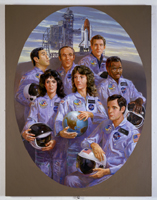 This past week marked the 20th anniversary of the Space Shuttle Challenger disaster. Much has already been said about this being a seminal moment in history, similar to the JFK assassination or the 9/11 attacks. Everyone remembers where they were when they heard the news of (fill in the blank.)
This past week marked the 20th anniversary of the Space Shuttle Challenger disaster. Much has already been said about this being a seminal moment in history, similar to the JFK assassination or the 9/11 attacks. Everyone remembers where they were when they heard the news of (fill in the blank.)
For me, the anniversary drives home how quickly time is passing. I was already well into my teaching career when the disaster occured. I had even entertained thoughts of applying for the Teacher in Space program, knowing I didn’t really have shot at it. Like many classrooms around the country that fateful day, our class was viewing the liftoff. From that point on, it seemed like everything stopped. We watched endless repeats of the explosion, as well as endless speculation as to what went wrong.
The Challenger disaster also made me realize how far our space program had lapsed. Coupled with the later Columbia disaster and NASA’s constant financial woes, manned space flight almost seems like a thing of the past. I have to wonder. Where is the spirit of adventure that drove the early space program? Is our technology so limited that we no longer have dreams of returning to the moon, or is it fear of losing more lives? Homer Hickam also lamented our apparent restriction to "low earth orbit" in his novel, Back to the Moon.
Of course, the financial situation is probably the strongest force working against manned spaceflight. With so many wanting to cut taxes and government spending (apparently for everything except Bush Baby’s little war), there are only so many dollars for scientific research. Laura’s sister cringes any time someone suggests more money for NASA, because that usually means less funds available for her ocean research. Wouldn’t it be nice if spending for the military came second to scientific research, or possibily even futher back, behind much-needed social programs.